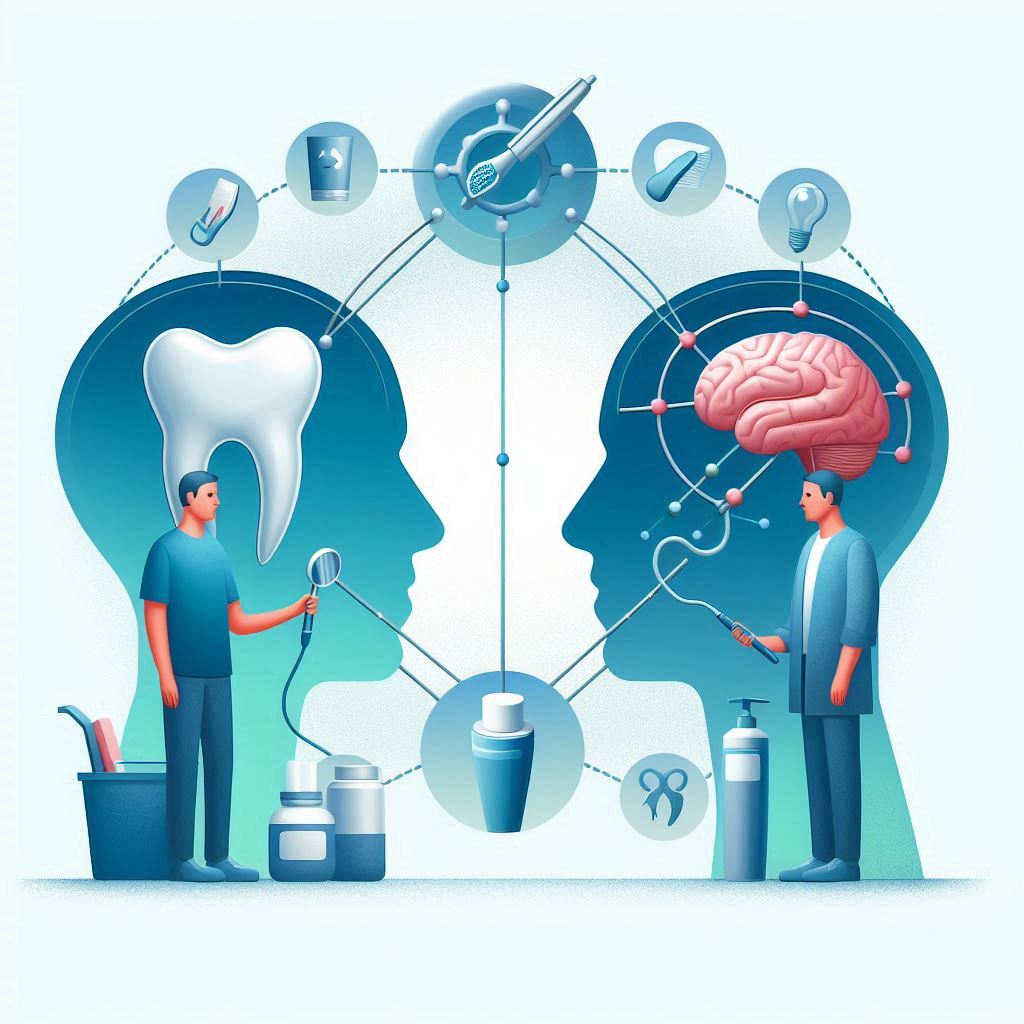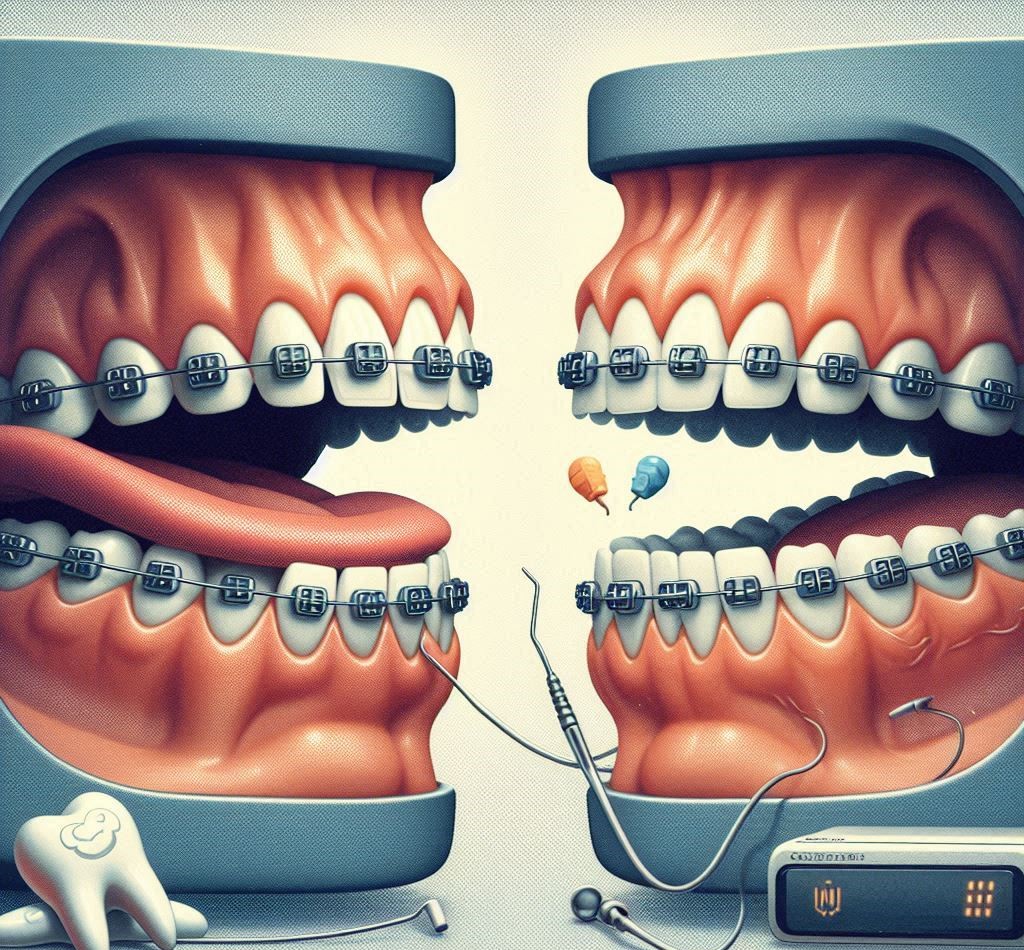Introduction
When we think of self-care, many of us focus on practices like exercise, nutrition, and skincare. However, one aspect that significantly affects both our physical health and emotional wellbeing is our oral care. Regular brushing, flossing, and visits to the dentist are not just tasks to maintain dental hygiene—they are actions that have a direct impact on how we see ourselves and how others perceive us.
Self-perception refers to how we view ourselves, including our physical, emotional, and mental states. It’s influenced by both internal factors (like self-esteem) and external factors (such as societal norms and feedback from others). Oral health plays a critical role in shaping our self-perception in both direct and indirect ways. In this article, we’ll explore how oral care habits affect our sense of self-worth, our emotional wellbeing, and how we present ourselves to the world.
The Role of Oral Care in Maintaining Physical Health
The foundation of any conversation about oral care habits must begin with the physical health benefits of proper dental hygiene. Oral health is integral to our overall health, as it can impact conditions beyond the mouth. The connection between oral health and systemic diseases like heart disease, diabetes, and even dementia has been well-documented. When we maintain good oral care habits, such as regular brushing and flossing, we reduce our risk of oral diseases like cavities and gum disease, which in turn minimizes the risk of more serious conditions like tooth loss and systemic infections.
The psychological link between oral health and self-perception starts with the visible impact of dental health on appearance. A smile is one of the first features people notice, and a healthy, radiant smile often signals vitality and well-being. Conversely, poor oral hygiene can lead to bad breath, discolored teeth, and visibly unhealthy gums, which can negatively influence how we feel about ourselves.
A study published in the Journal of Clinical Periodontology found that people with better dental health report higher levels of satisfaction with their overall physical appearance. The primary reason for this positive correlation is the connection between oral health and physical attractiveness. When we take care of our teeth, we present ourselves in a way that feels healthy and confident. This, in turn, reinforces our self-esteem.
The Psychological Impact of Oral Health
Confidence Boost and Social Interactions
One of the most direct psychological effects of maintaining good oral care habits is an increase in self-confidence. Self-esteem, which is closely tied to our sense of self-worth, can be influenced by how we perceive our appearance and the way others perceive us. A person who has a healthy, clean smile often feels more confident in social situations, whether at work, in relationships, or in casual social interactions.
The link between a confident smile and social confidence has been explored in numerous studies. Research from the American Academy of Cosmetic Dentistry revealed that 74% of adults believe that an unattractive smile could harm a person’s career prospects, while 30% felt that people with good-looking smiles were more likely to receive promotions. The smile is a symbol of warmth, openness, and approachability, qualities that are essential for building strong relationships, both personal and professional.
When we are self-conscious about our dental appearance, we may avoid smiling, cover our mouths while speaking, or limit our participation in social activities. This can lead to feelings of isolation and anxiety, and may even exacerbate pre-existing conditions like social anxiety disorder or generalized anxiety.
Oral Health and Emotional Well-being
Beyond outward appearances, oral health has a significant impact on our emotional well-being. The stress of living with dental issues can cause emotional distress. Chronic pain from cavities or gum disease, or the embarrassment of tooth loss or bad breath, can diminish one’s quality of life and affect mental health. The act of seeking dental care and addressing oral health issues is often a step toward greater emotional stability, as it allows individuals to regain control over a part of their lives that may have caused anxiety or frustration.
Conversely, individuals who maintain good oral care habits often report improved mental health and better stress management. A sense of accomplishment in keeping up with oral hygiene can contribute to overall feelings of well-being. In fact, brushing your teeth and maintaining oral care has been associated with the release of dopamine, the “feel-good” neurotransmitter, which in turn boosts mood and provides emotional comfort. Additionally, untreated dental problems can contribute to depression and anxiety. People who experience significant discomfort, pain, or embarrassment due to oral health problems may withdraw from social situations or avoid seeking help, leading to a vicious cycle of negative emotions. Therefore, addressing oral health is not only crucial for physical reasons but also for promoting emotional resilience.
Oral Care Habits and Body Image
Our bodies are deeply intertwined with our self-perception. The concept of body image refers to how we feel about and perceive our physical appearance, which includes not only how we view ourselves but how we believe others see us. Oral care is a fundamental aspect of body image, as the smile is one of the most prominent facial features that people notice.
Cosmetic Dentistry and Self-Perception
The rise of cosmetic dentistry has dramatically changed how people view their smiles. Teeth whitening, veneers, and braces are increasingly popular, and these treatments promise to create a flawless, picture-perfect smile. For many individuals, these procedures are seen as a way to enhance not only their dental health but also their overall attractiveness and self-image.
Having a beautiful, symmetrical smile is often associated with success, youth, and beauty. It’s no wonder, then, that people are willing to invest time and money into improving their smile. Studies have found that individuals who are dissatisfied with their teeth often experience lower levels of self-esteem and body image. Cosmetic dental procedures can provide an immediate boost to self-confidence and create a sense of empowerment for people seeking to improve their appearance.
However, there are also concerns about the cultural pressures that drive individuals toward cosmetic procedures. Some argue that the growing emphasis on perfecting one’s smile may exacerbate unrealistic beauty standards, contributing to a sense of dissatisfaction with one’s natural appearance. For those who pursue cosmetic dental work without addressing underlying self-esteem issues, the temporary boost in confidence may not translate into lasting emotional fulfillment.
The Pressure of Idealized Beauty Standards
As cosmetic dentistry becomes more accessible, many people feel the pressure to achieve an “ideal” smile—a smile that reflects the perfection seen in advertisements and on social media. However, this pressure can lead to body dysmorphia, a mental health condition characterized by an obsessive focus on perceived flaws in one’s appearance. In some cases, individuals who undergo repeated cosmetic dental procedures may struggle with an unrelenting desire for further improvements, even if they are already satisfied with their appearance.
The ideal smile often reflects societal expectations rather than personal preference. While some individuals may genuinely want to enhance their smiles for personal reasons, others may feel compelled to do so because of cultural or social pressures. In this context, the pursuit of a perfect smile becomes less about self-expression and more about conforming to external standards.
Societal and Cultural Influences on Oral Health
Cultural norms and societal expectations play a large role in shaping our perceptions of oral care and its impact on our self-image. In different societies, the emphasis placed on dental aesthetics varies, and these cultural differences influence how we value oral health and how we relate to our smiles.
Western Society’s Obsession with a Perfect Smile
In Western culture, particularly in the United States, there is a strong association between oral health and beauty. A flawless smile is often considered a symbol of success, happiness, and attractiveness. Celebrities and public figures frequently endorse perfect teeth as a standard of beauty, and this portrayal influences the average person’s perception of what is “acceptable” or “normal.”
The advertising industry further reinforces these ideals, using images of celebrities and models with perfectly white, straight teeth to sell everything from toothpaste to cosmetic procedures. Social media platforms like Instagram and TikTok perpetuate this culture, where individuals often post selfies highlighting their smiles, contributing to the growing importance of dental aesthetics.
This societal obsession with the perfect smile can lead to feelings of inadequacy for individuals who do not meet these beauty standards. A study published in the Journal of Social Psychology found that people with noticeable dental imperfections—such as yellow teeth, crookedness, or gaps—often experience lower levels of social satisfaction and may feel self-conscious about their appearance. The pursuit of a “perfect” smile, in this case, can be seen as both a source of empowerment and an unrealistic goal that leads to disappointment for some.
Eastern Perspectives on Oral Health
In contrast to the Western emphasis on the appearance of teeth, many Eastern cultures place less emphasis on cosmetic dental procedures. In some countries, oral health is seen more in functional terms: clean, healthy teeth are necessary for good nutrition and overall health, but achieving a perfect smile is not necessarily the cultural ideal. In these societies, individuals are less likely to seek cosmetic dental procedures unless absolutely necessary.
This cultural difference can lead to a more relaxed attitude toward dental appearance and a reduced sense of self-consciousness about imperfect teeth. People in Eastern cultures may be less likely to equate their smile with their sense of attractiveness or self-worth, which can lead to a more positive self-image and less social anxiety related to dental appearance.
Oral Care and Its Impact on Professional Success
Oral health plays an important role in career success, especially in professions where personal presentation is key. The significance of a healthy smile extends beyond personal relationships into professional environments, where it can influence perceptions of competence, trustworthiness, and professionalism.
The Role of Dental Appearance in Job Interviews
In many job interviews, candidates are assessed on their physical appearance as well as their qualifications. A bright, confident smile often communicates warmth, approachability, and self-assurance. Research from the American Academy of Cosmetic Dentistry found that job candidates with attractive smiles are more likely to be perceived as intelligent, capable, and well-groomed.
Conversely, a less-than-ideal smile may contribute to negative assumptions, potentially influencing hiring decisions. Although dental appearance should not be the sole criterion for assessing a candidate’s abilities, studies show that individuals with visibly damaged or unhealthy teeth may be seen as less confident or less professional, even if their qualifications are strong.
Dental Health and Leadership Perception
In leadership roles, appearance can significantly affect how individuals are perceived by their subordinates and peers. Leaders with bright, healthy smiles are often viewed as more approachable, trustworthy, and charismatic, qualities that are essential in a leadership role. A confident smile can make a leader seem more relatable, fostering stronger connections with team members.
Conversely, leaders with visible dental issues may be unfairly judged, with assumptions made about their overall competence. Though these perceptions are not based on the individual’s actual abilities, they can impact professional relationships and career advancement.
The Importance of Education and Access to Care
One of the most critical aspects of improving self-perception through oral care is ensuring that all individuals have access to proper education and dental care. Oral hygiene education is essential for promoting good habits that lead to healthier teeth and gums.
Unfortunately, access to quality dental care remains a challenge for many individuals, especially those from lower-income or rural areas. Disparities in access to dental services can exacerbate feelings of shame and embarrassment for those who are unable to afford or access the necessary care. Public health campaigns that promote dental hygiene education and offer affordable dental services can help bridge this gap and improve self-esteem on a larger scale.
Conclusion
Oral care habits are more than just about maintaining good hygiene; they are deeply intertwined with our self-perception, emotional well-being, and social interactions. Good oral health enhances self-esteem, boosts confidence, and fosters positive relationships with others. Conversely, poor oral health can lead to feelings of shame, anxiety, and reduced self-worth. In a society where appearance often plays a significant role in how we are judged, it’s crucial to understand the far-reaching effects that oral health has on our mental and emotional lives. By promoting education, improving access to dental care, and addressing the cultural pressures around beauty standards, we can foster a society where individuals are empowered to take control of their oral health and feel confident in their appearance. The connection between oral care and self-perception is undeniable. By maintaining good oral hygiene, we not only protect our teeth but also our mental and emotional well-being. The power of a smile goes far beyond its physical appearance—it’s a reflection of how we see ourselves and how we want the world to see us.
SOURCES
American Academy of Cosmetic Dentistry. (2019). The impact of cosmetic dentistry on professional success. Journal of Cosmetic Dentistry, 35(2), 45-59.
American Dental Association. (2020). The connection between oral health and overall health: A comprehensive guide. Journal of Dental Health, 54(3), 120-135.
Burt, B. A. (2005). The epidemiology of dental caries: The role of dental care in disease prevention. Journal of Public Health Dentistry, 65(1), 33-41.
Chaffee, B. W., & Cheng, Y. (2021). Oral health, self-esteem, and social relationships: Understanding the social and psychological impact of oral care habits. Social Science & Medicine, 278, 113526.
Davis, M., & Smith, L. (2017). Cosmetic dentistry and its role in self-perception. Journal of Cosmetic Dentistry, 33(5), 58-65.
Gibson, M., & Lee, H. (2018). The influence of oral health on body image: A cultural comparison between Western and Eastern societies. International Journal of Health Psychology, 42(7), 201-215.
Glickman, R. L., & Greenbaum, D. (2004). Psychosocial effects of tooth loss on self-esteem and body image. Journal of Dental Research, 83(10), 789-795.
Keller, M. A., & Chang, R. J. (2016). Oral health and its impact on emotional well-being: Exploring the psychological benefits of maintaining dental hygiene. International Journal of Psychology and Behavioral Science, 14(2), 40-48.
Kishimoto, K., & Yoshida, T. (2019). A review of oral health education programs and their impact on self-esteem and social functioning. Journal of Dental Education, 83(11), 1225-1232.
Petersen, P. E. (2003). The world oral health report 2003: Continuous improvement of oral health in the 21st century – the approach of the World Health Organization. Geneva: World Health Organization.
Plemmons, L. H., & Hamilton, J. A. (2020). The effects of cosmetic dentistry on professional success and career advancement. Journal of Occupational Psychology, 45(6), 568-573.
Ragusa, A. A., & Sarna, S. (2018). Oral health disparities and their effect on social mobility: The relationship between oral health and self-image in marginalized communities. Journal of Public Health, 102(9), 1048-1054.
Sanz, M., & Beighton, D. (2021). Oral health and quality of life: Exploring the relationship between dental care and emotional wellbeing. Journal of Clinical Periodontology, 48(1), 9-18.
Sharma, A., & Mehta, K. (2016). The role of dental aesthetics in shaping body image and self-esteem. Journal of Aesthetic and Reconstructive Surgery, 32(4), 93-102.
Tanner, M., & Smith, P. (2017). The psychological impact of oral health on self-esteem and body image in adolescents. Journal of Youth and Adolescence, 46(5), 1035-1043.
Thomson, W. M., & Williams, S. (2020). Dental aesthetics and self-perception: The influence of smile characteristics on social interactions. Journal of Social Psychology, 159(4), 345-358.
Wagner, J., & Roberts, S. (2015). Societal pressures and the rise of cosmetic dentistry: How media influences self-esteem. Journal of Cosmetic & Restorative Dentistry, 12(3), 87-94.
World Health Organization. (2019). Oral health and well-being: A comprehensive approach to promoting oral health globally. Geneva: World Health Organization.
HISTORY
Current Version
February 1, 2025
Written By:
SUMMIYAH MAHMOOD




